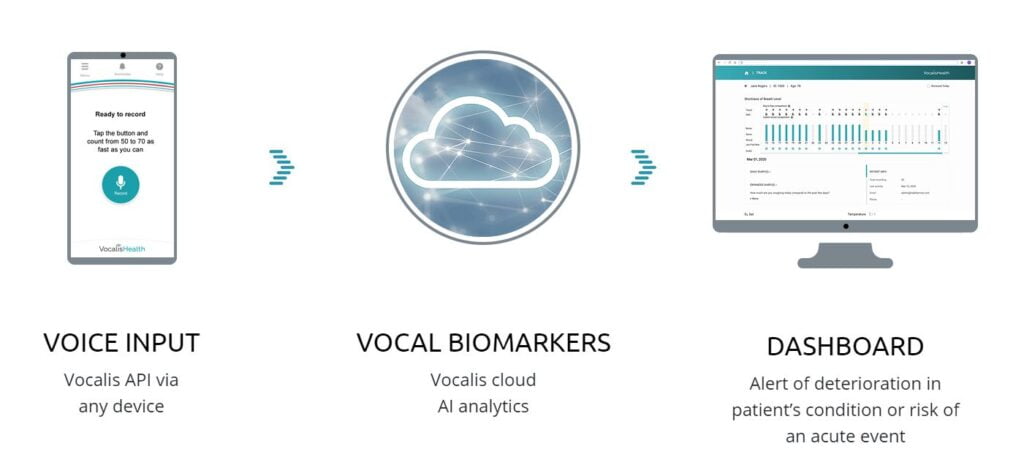Israeli startup Vocalis Health, the developer of voice analysis tests to detect and monitor medical conditions and illnesses, will work with the Mayo Clinic, a leading American academic medical organization, to research and develop new voice-based tools to screen and detect patient health, the parties announced this month. The joint collaboration will begin with a study to identify the vocal biomarkers for pulmonary hypertension (PH), a type of high-blood pressure condition that affects the arteries in the lungs and the right side of the heart.
According to the Mayo Clinic, the condition is hard to diagnose early because it is often not detected in routine medical exams – and the symptoms are often too similar to those of other heart and lung conditions.
SEE ALSO: Speech Analysis Startup Cordio, Rambam Hospital To Trial Voice-Based Test For COVID-19 Patients
PH can be life-threatening for some people, and there is currently no cure for certain types of the condition. Treatments for PH include alleviating symptoms such as shortness of breath, dizziness, fatigue, chest pressure, and swelling in the lower limbs. It can be caused or triggered by other existing conditions or illnesses such as lung disease and heart disease, and blood and inflammatory disorders.
The collaboration between Vocalis Health and the Mayo clinic aims to provide an alternative to check patients for PH, using only a recording of the patient’s voice, to understand their health and the progression of the disease.

“The majority of patients with pulmonary hypertension remain asymptomatic at the initial phase of the disease,” says Dr. Amir Lerman, the associate chair of the Department of Cardiovascular Medicine and the director of the Cardiovascular Research Center at Mayo Clinic. “This new technology has the potential to detect and screen individuals and patients with pulmonary hypertension remotely, from a distance, using non-invasive, non-intrusive, and inexpensive technology.”
“If successful, this technology has the potential to also help in monitoring the treatment of patients with pulmonary hypertension,” Dr. Lerman, who is also medical director of Mayo-Israeli startup company initiative, tells NoCamels in an email statement.
Vocalis Health and the Mayo Clinic previously worked together on research to establish the vocal characteristics of PH. In this new collaboration, the Mayo research team will conduct a prospective clinical validation study to further develop the vocal biomarkers.
The clinical validation will use Vocalis Health’s proprietary software, operated from any connected voice platform – mobile, computer, tablet – to analyze patients’ health based on voice recordings.

The study is expected to take several months and will include an estimated 400 participants, Vocalis Health President and CEO Tal Wenderow tells NoCamels via email.
Wenderow explains that Vocalis Health’s vocal biomarker “is an AI algorithm that deploys state-of-the-art, proprietary machine learning/deep learning processing techniques to a person’s voice to assess correlation with a variety of diseases, symptoms and medical conditions.”
The algorithm converts audio recordings to visual images, or spectrograms,. and then uses “computer vision techniques, correlated with the patient’s medical records, to find small changes in the spectrogram, from which the algorithm generates a unique signature per disease/condition and for each individual patient,” he says.
For this study, patients will record their voices using the Vocalis Health research app before undergoing a routine echocardiogram, an ultrasound of the heart. Both will be done in the hospital. The Mayo Clinic’s headquarters are in Rochester, Minnesota and it has main campuses in Phoenix, Arizona, and Jacksonville, Florida.
Sign up for our free weekly newsletter
SubscribeVocalis Health will then use this data, the echo, and their voice to further optimize, train, and validate the vocal biomarker, Wenderow says.
In the previous study with Vocalis Health’s tech conducted in 2017 and 2018, researchers at Mayo, including Dr. Lerman, and physicians at the Sheba Medical Center and the Sackler School of Medicine at Tel Aviv University found a relationship between a noninvasive vocal biomarker and measured indices of pulmonary hypertension obtained during an invasive procedure to diagnose cardiovascular conditions.
“These results may have important practical clinical implications for telemedicine and remote monitoring of patients with heart failure and PH,” wrote the authors of the study, published in 2019 in the peer-reviewed open access scientific journal, PLOS One.
Vocalis said that following this next phase, researchers will also work to identify vocal biomarkers targeting additional diseases, symptoms, and conditions.

“There are a few additional conditions under consideration, but those plans are still being developed,” Wenderow tells NoCamels.
In March, Vocalis launched a large-scale study to triage, screen and monitor for COVID-19 symptoms, looking for a unique vocal ‘fingerprint’ that could detect a deterioration in the health of coronavirus patients as well as flag potential indications.
Wenderow tells NoCamels the multi-center study is now complete and the company has a working vocal biomarker for COVID-19 currently in use in a number of clinical validation studies. There are also “commercial implementation projects with more to come,” he indicated.
SEE ALSO: Mayo Clinic To Implement Diagnostic Robotics’ AI Patient Triage, Prediction System
Following the establishment of the clinical benefits of voice analysis for patient screening throughout the COVID-19 pandemic, the collaboration with the Mayo Clinic “presents an opportunity for us to continue broadening our research, beginning with pulmonary hypertension,” Wenderow said in a company statement.
“Voice analysis has the potential to help physicians make more informed decisions about their patients in a non-invasive, cost-effective manner. We believe this technology could have important clinical implications for telemedicine and remote patient monitoring in the very near future. We are excited to work with Mayo Clinic and have already started planning clinical trials for additional indications,” he went on.
Vocalis was established in 2019 as a merger between startups Healthymize (founded in 2016) and Beyond Verbal (founded in 2012, and raised $9 million in a funding round led by VC fund aMoon, co-founded by Dr. Marius Nacht.
Related posts

Editors’ & Readers’ Choice: 10 Favorite NoCamels Articles

Forward Facing: What Does The Future Hold For Israeli High-Tech?

Impact Innovation: Israeli Startups That Could Shape Our Future




Facebook comments